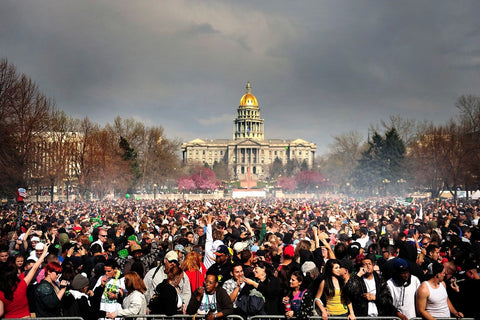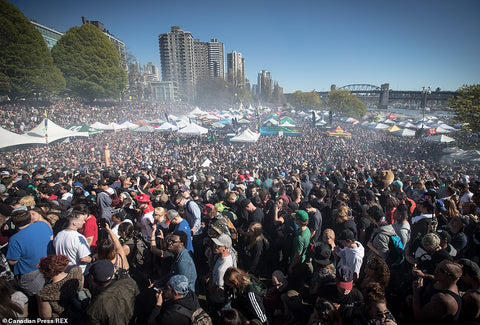Let's dive a little deeper into the history of this important day in the legalization debate.
April 20, or "420" as it is commonly known, has become a symbolic day for supporters of cannabis legalization and cultivation.
But where did this date come from and what is its history?
The History
The history of 420 Day dates back to the 1970s, when a group of high school students in San Rafael, California, gathered at 4:20 p.m. to smoke cannabis. These students, who were part of a group of friends nicknamed "Waldos," used the term "420" to refer to their activity, and the number became synonymous with smoking pot.
420 Day became popular among local youth, and the date was quickly adopted as an opportunity to celebrate cannabis culture. Over the years, April 20 has become a holiday for marijuana enthusiasts around the world. Not only is April 20 a day to smoke cannabis, but it has also become an opportunity for marijuana legalization supporters to hold rallies and public events to raise awareness about the issue. In many countries, April 20 has been declared National Cannabis Day.
The Celebration
While celebrations may vary from country to country, many people commemorate 420 with events, festivals and demonstrations celebrating cannabis and its culture. We've compiled a small overview of what's happening in each country:
In the United States, 420 Day has become a major annual event for cannabis users. Many smokers gather at large gatherings, such as the 420 Festival in Atlanta or the Cannabis Festival in Denver. In San Francisco, thousands of people gather every year in Golden Gate Park to smoke cannabis together.

In Canada, 420 Day took on new meaning in 2018 when the government legalized recreational cannabis. Many Canadians celebrate 420 by visiting cannabis dispensaries or attending festivals and events.

In Europe, 420 Day is celebrated in many countries, but with different traditions. In Amsterdam, a city known for its coffee shops and coffeeshops, many people gather to smoke cannabis and enjoy the view of the famous canals. In Germany, 420 Day is often celebrated with parties and concerts, like the Berlin Cannabis Festival.

In South America, 420 Day is often seen as an opportunity to protest against drug laws that criminalize cannabis use. In Brazil, demonstrators gather en masse to demand the legalization of cannabis and an end to the war on drugs.
In Africa, 420 Day is often celebrated with cultural events commemorating the history and culture of cannabis. In South Africa, for example, many people attend the Cannabis Expo to learn more about cannabis cultivation and the medicinal properties of the plant.

The current situation
Although 420 Day is also criticized by some people who claim that its celebration encourages drug use and the cultivation of highs, especially by the more conservative parties, it must be recognized that it is a key moment. Indeed, it is one of the few moments when this subject, which could influence the economic and social future of many countries, becomes a subject of debate.
Indeed, the legalization of cannabis continues to be an issue in many countries around the world, with some governments legalizing the medical or recreational use of marijuana, while others prohibit it completely. In many countries, cannabis use remains a criminal offense, and those arrested for possession or sale face jail time and criminal conviction. While proponents of legalization argue that cannabis has multiple therapeutic uses and that regulating it could lead to increased tax revenues and reduced crime, legalization could also improve access to medical treatment for those in need.
In many countries, cannabis legalization is still a work in progress, but April 20 helped bring the issue to the forefront of public opinion. The celebration of April 20 as Cannabis Day has made many people aware that cannabis is a plant with multiple uses, not just a recreational drug.
Conclusions
While we look forward to a future where 420 Day can be celebrated every day, we must consider that there are many advances that give hope that this is not just a dream. The debate is at the center of media attention after the liberalization that is taking place in the United States and we can only hope that the topic will soon be addressed in our country as well

